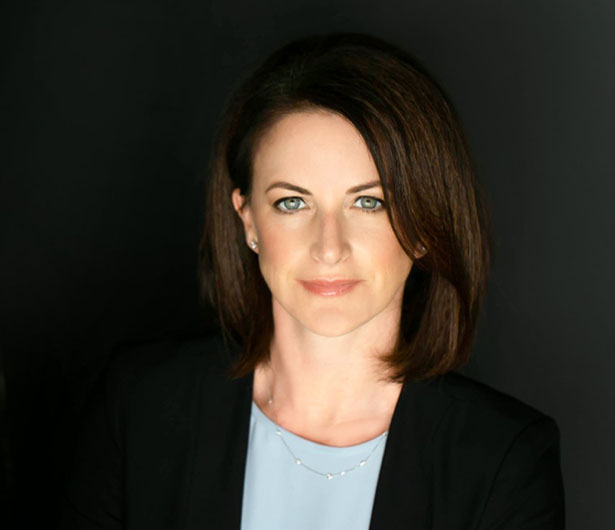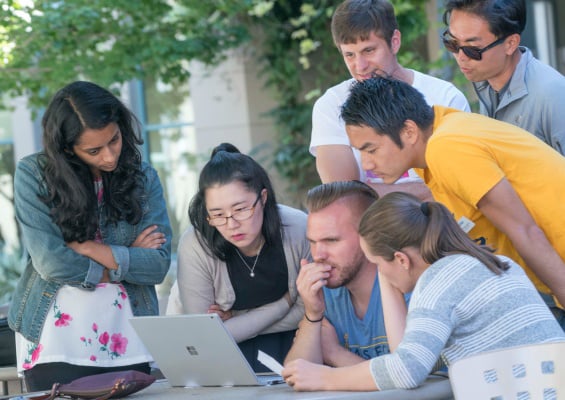Embracing data, developing her leadership skills, and networking have been key factors in Sally Allain’s career and her fight against disease. Her most recent move is a promotion to the position of head of JLABS @ Washington DC, Johnson & Johnson Innovation.
You had a 15-year career in the biotech, pharmaceutical, and healthcare fields, much of it at Johnson & Johnson, before you enrolled in the Berkeley MBA for Executives program. Did you feel like you’d hit a glass ceiling?
No. I didn’t see my gender as a ceiling, particularly at J&J. The issue in my mind was that I had a master’s degree in immunology and microbiology and started as a scientist before moving to roles on the business side. I had taken a few business courses and certifications but no formal degree program. I could see that having an MBA would give me more knowledge to enhance my past experiences in moving up within the organization.
How well represented are women in your field?
The healthcare and pharmaceutical environment is interesting. I tend to see more women in healthcare than in other industries, such as IT or engineering. Something I always look at, a real truth-teller, is how many women are put on panels as experts at conferences and industry events. There, you see a growing trend and more women in VP or senior roles. But it certainly hasn’t hit the 50/50 level. Women are still under-represented in the C-suite.
What attracted you to Berkeley?
For me, the first impression that drew me to the EMBA program was the diversity: the diversity of the coursework and the wide diversity of individuals—whether personal background or industry experience. I knew that I would get to sit next to and learn from them and their industries—how they run things differently—and take that back to my own company.
The other was the percentage of women in the class. It was important for me to sit next to other women in business at a similar stage in their careers. I know Berkeley’s aim is to increase the percentage of women in the EMBA program and be representative. I think we had one of the highest percentages of women in an EMBA program at that time, about 30 percent.
What were your specific goals in getting an MBA?
There were a couple. I wanted an education with classes that established a foundation in accounting and finance. Then I wanted to take away an understanding of the framework of corporate strategy. Another big piece was to have tools that could enable me to move up within my company. I wanted to strengthen my leadership skills from different angles.
I do know I’m a completely different leader now."
What was the most valuable aspect of the Berkeley Haas program: the courses, the experiential learning, the networking?
They’re hard to separate. It is such a full-circle program, combining all three. I already mentioned the coursework. Another big draw was the extensive immersion weeks, which were tremendous and impactful, especially for someone coming from a large company. One entrepreneurship immersion had us meeting with and visiting more than 20 companies at all stages of development, from early in stealth mode to a meeting with Airbnb. The uniqueness was getting to meet in person with those who started companies, those in the trenches, and company CEOs. It’s beyond just reading business cases.
And the network has been really important. I have classmates I talk to weekly whether for business or personal feedback or prepping for a meeting. I have a group on speed dial. Our class was so engaged. Just knowing I have someone I can instantly call to get a question answered or help, with full knowledge they’ll answer, is pretty profound.
You had management roles at Jansen before you went for your EMBA. How would you evaluate yourself as a manager and leader before you got to Berkeley?
That’s a tough one. I think it’s a case of not knowing what you don’t know. But I do know I’m a completely different leader now.
The leadership program starts with understanding who you are as a person. We did a lot of inner work on how we got to where we were, on our professional and personal stories—the things that build who you are. Then you layer on different leadership styles. It’s also about becoming more empathetic, listening, understanding the right questions to ask, and learning how to negotiate. It’s a full circle, but it starts with you as an individual.
How did the MBA contribute to your ability to move into a more strategic role at J&J?
It definitely gave me the confidence to move into roles I probably wouldn’t have considered myself for before. I came out of the program thinking differently, analyzing differently, and believing in myself more.
Do you feel as if you’re treated differently now?
I didn’t think I was going to be, but I see that I am. Having that MBA from Berkeley is impactful.
What have you directly applied to your job from Berkeley?
Oh a lot! For example, I look at data differently. I think about developing a strategic framework and asking more questions about a problem before trying to answer. I continually Question the Status Quo. Fortunately, I’m in a group at J&J where we are really on the edge of innovation, where we tend to do things slightly differently and look for innovation and partnering.
What advice do you have for women like you—working full time, with kids—in taking on an MBA?
I think women who are parents and working full time are already doing an incredible job of figuring out how to balance everything that’s going on. Taking on an MBA on top of that means recognizing you have to ask for help. One thing I think is innate in women is the belief that you have to do everything for your family and kids and the job. But we don’t always help ourselves. You have to let some things go and let somebody else pick it up; whether that’s your partner or possible outside help.
Who do you admire most?
Two women I’ve been following for a couple of years: Mellody Hobson, president and CEO of Ariel Investments. She’s talked a lot about diversity and inclusiveness in business. A lot of companies talk about it, but there’s not been a performance metric used to hold themselves accountable. But to do that, things have to drastically change.
The other is Melinda Gates and the Bill and Melinda Gates Foundation. They are constantly questioning growth in the healthcare field for women and children, which will in turn drive economic outcomes.
What do you want to contribute to the healthcare field?
Faster, cheaper, more impactful solutions for patients. We’re at a point that some development is extremely expensive. We need to identify constructive innovations that will move us forward. How can I help solve some of the problems of disease? How can we identify and intercept diseases earlier? I really love the strategic initiatives that J&J is working on, especially its global healthcare awareness, whether its TB or HIV or finding solutions for Ebola. I want to have an impact.









